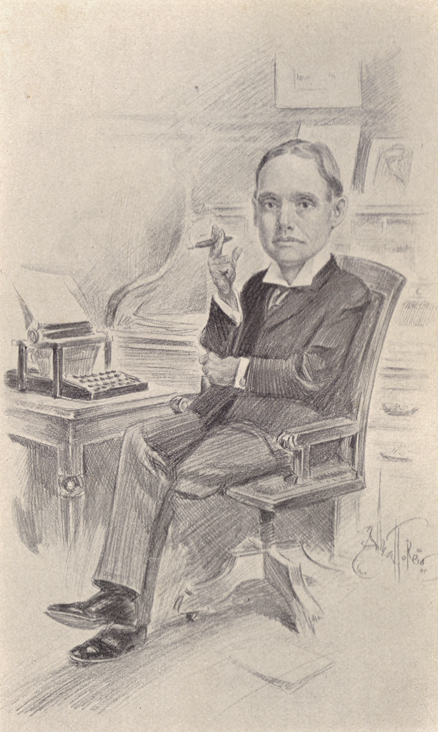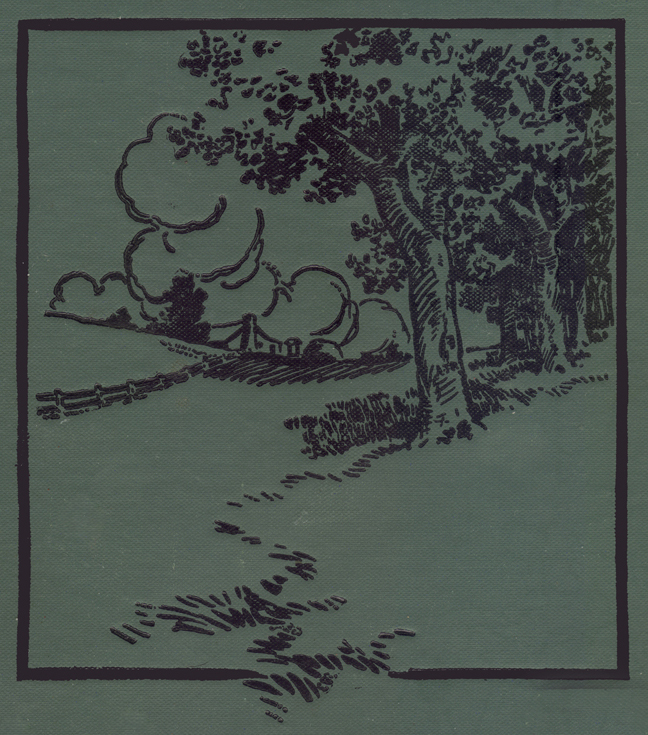
From At the Grass Roots, Comprising “The Christmas of 1883,” and Other Vagrant Sketches, by Elmer House (Dodd Gaston), with Cover Design and Frontispiece by Albert T. Reid, Topeka: Monotyped by Crane & Company, 1905; pp. 25-29.

A PASSING GLANCE AT ’SQUIRE HARMON.
Andrew Jackson Harmon was one of the “characters” of our neighborhood. Harmon was a New-Yorker by birth and a Democrat by profession, who farmed a little as a side line. He put in most of his time talking politics, however, and if the neighbors were all busy he mounted his horse and rode until he found a man idle enough to listen to him. It was one of the neighborhood “stories” that he was once seen sixteen miles from home at the sunset of a bitter winter’s day engaged in a hot discussion of the tariff with a man who was splitting wood by the roadside. The man was doing his evening “chores” and Harmon had ridden up and started an argument.
Harmon was a little sawed-off man with whiskers like General Grant’s. He wore habitually a frock coat, and, being short 26 in stature, the tail of it flapped against his legs midway between his knees and his ankles. He had a good frock coat in which he arrayed himself for “literaries,” dances, spelling-schools, county conventions, and on his trips afield. He had an old and rusty garment of the same length and contour which he wore about his work on the farm. But, summer or winter, no day or occasion which demanded a coat caught him garbed in anything other than a frock. Another sartorial idiosyncrasy which distinguished Harmon from his associates was that when he wore a white or, in the local vernacular, a “boiled” shirt, he also wore cuffs with it. In Kansas in the early eighties it was not difficult to find a sovereign who owned a white shirt, but those who owned both shirt and cuffs were indeed rare enough.
I have often thought that had Harmon been a Republican he would have gone to Congress. Certainly, I never heard a 27 more eloquent public speaker. He was fairly well educated, exceedingly well informed, and had a command of good English that was marvelous. He never made a speech, no matter what the subject, without referring to Thomas Jefferson, Andrew Jackson and John C. Calhoun. Occasionally he referred to Daniel Webster, but Webster having been a Whig, Harmon was a little chary about pushing him to the front.
Being a Democrat, and disliked not only by the Republicans but by many of his own party as well, Harmon never achieved much political distinction. Once his party ran him for justice of the peace, but he was beaten overwhelmingly, and his services in an official capacity were restricted to one term as clerk of the school board of the district in which he lived. As a delicate recognition of the fact that he had once run for justice of the peace, the neighbors always called him “’Squire” to his face, 28 although behind his back they referred to him as “Jack” or “Old Jack.”
Harmon was the most arrant coward I have ever known. Being forever in a political discussion, he was likewise always in a quarrel with some one. As he was exceedingly abusive and insulting in his arguments, he was always tempting some partisan of the opposite faith to chastise him. But he always managed somehow to avoid a personal encounter. He would begin by putting up a strong bluff, and if that failed to stop his adversary and damage to his features seemed imminent, he would pose majestically and say: “I have heart disease. The doctors say I can live no more than three years at most. Strike me at your peril.” That usually stopped the man he had insulted. If it didn’t, Harmon slunk away like a whipped puppy. Although I saw him probably in fifty quarrels where a personal encounter seemed likely, I never knew a man to lay a finger on him.
29 Harmon had one body, upon whom his hopes centered. The boy was smart and made almost as good a speech as his father. The father’s dream was to make a statesman of the son, and he bought a lot of law books and set him at the task of reading law. But when the boy finally left home he went to town and opened a billiard hall. The father never seemed the same afterward: the apostasy of the boy broke his spirit and his heart.
